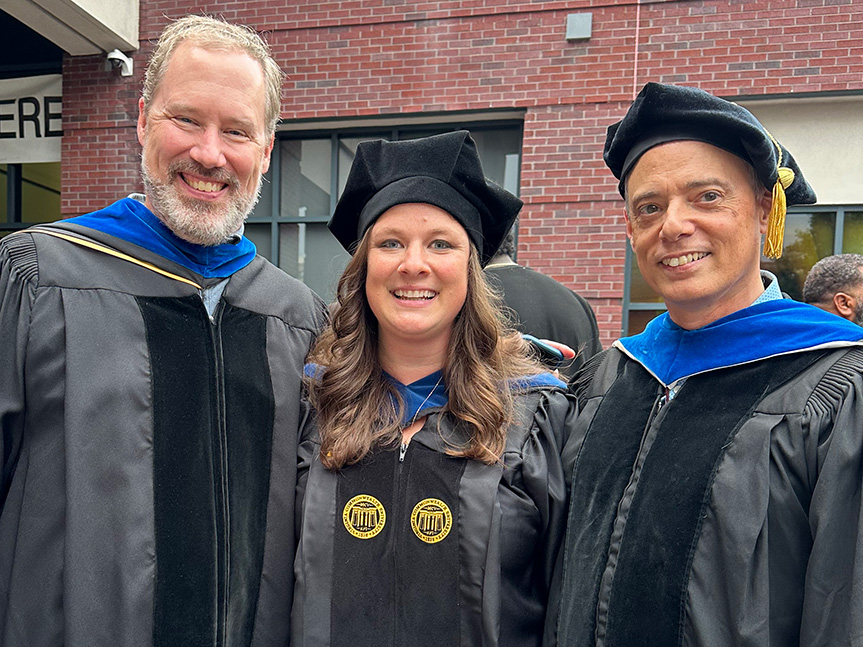Alumni Q+A: Stephanie Violante, Ph.D., (M.S. ’18, Ph.D. ’23) utilizes her training from VCU to treat childhood anxiety
Sept. 16, 2025

Stephanie Violante, Ph.D., (M.S. ’18, Ph.D. ’23) is a child and adolescent psychiatrist at UCLA Health. She recently accepted the role following a successful fellowship at UCLA’s Semel Institute for Neuroscience and Human Behavior focused on childhood OCD, anxiety and tic disorders.
The Seattle, Wash. native was drawn across the country by the opportunities available in VCU’s Department of Psychology, and she quickly became a Richmonder as she fell in love with the campus and the city. In addition to her postgraduate studies, Violante is an alumna of VCU’s CREATE Lab (Children Receiving Effective and Accessible Treatment) which provided important experience ahead as she prepared for her current role.
After completing your undergraduate studies near your hometown of Seattle, Wash., what drew you to move to the opposite side of the country for the Ph.D. program at VCU?
I had applied directly to Ph.D. programs in clinical psychology and part of that application process is to find both a program and a faculty advisor that are a good fit for your clinical and research interests. I applied specifically to work with Dr. Bryce McLeod given his involvement in treatment process and implementation science research, which I had developed interest in as an undergraduate student and post-baccalaureate research coordinator at the University of Washington.
I was drawn to VCU’s clinical psychology Ph.D. program due to its prioritization of both research and clinical training, the collaborative nature of the psychology department, the camaraderie among students, the wide variety of clinical training opportunities, and the ability to specialize in child and adolescent psychology. I also LOVED Richmond when I visited for my interview.
What inspired you to choose postgraduate studies?
I was about 12 years old when I first discovered psychology and decided I wanted to become a child and adolescent clinical psychologist. I was fascinated by understanding human emotions and behavior, and I had always been drawn to working with children, so completing postgraduate studies has been a part of my plan since then.
What is your first memory or first impression when you arrived on campus?
The first time I visited VCU’s campus was when I came for an in-person interview. Having been born and raised on the West Coast, I was instantly charmed by the architecture – especially the colorful row houses – and the murals. I also distinctly remember the positive and supportive energy of the program’s current graduate students.
Was there a faculty member that made a particular impact on your education and/or career journey? How so?
My faculty advisor, Dr. Bryce McLeod, was incredibly impactful throughout my time at VCU and beyond. He has been an invaluable mentor in research, clinical work and professional development. Clinical psychology graduate programs can be very overwhelming because you are juggling research projects, clinical practicum, classwork and a 20-hour per week assistantship. Dr. McLeod helped me navigate the stressors of graduate school and develop a sense of self-efficacy through support, guidance, gentle pushing when needed and a lot of humor.
With the Department of Psychology offering four areas of focus for its Ph.D. program, what inspired you to choose clinical psychology?
Of the four areas of focus the Department of Psychology offers, only ‘clinical’ and ‘counseling’ involve clinical training and allow you to practice as a clinician after graduation. There is a lot of overlap between clinical and counseling psychology, however clinical psychology tends to focus more on serious mental illness and medical psychology (although there are many counseling psychologists with expertise in these areas as well) which was more in line with my clinical interests.
Where was your favorite place to hang out on campus?
During my first two years, I spent most of my time on campus (when I wasn’t in class) in the graduate student and faculty reading room on the fourth floor of Cabell Library with my cohort mates, completing our classwork and theses. I also spent quite a bit of time in White House for my graduate assistantship. We were kept busy enough that there was not a ton of free time to hang out around campus.
Since completing your Ph.D. in 2023, how has your career/life journey progressed?
Since graduating, I completed a fellowship at UCLA in the Department of Psychiatry to further my specialization in the areas of childhood anxiety, OCD, tics, body-focused repetitive behaviors and pediatric psychology, supporting the mental health of youth experiencing acute or chronic illness. After completing my fellowship, I was hired as an attending psychologist in the UCLA Child OCD, Anxiety and Tic Disorders Clinic and the UCLA Center for Anxiety, Resources, Education and Support.
As a child and adolescent psychiatrist, what does your day-to-day work look like in your role?
As an attending psychologist in a training clinic at an academic medical center, my days consist of some combination of the following: teaching graduate student trainees about how to recognize, diagnose, and treat anxiety, OCD, tics, and related disorders in youth, meeting with trainees for individual and group supervision of their cases, live observing trainee sessions and providing feedback, seeing my own patients, mentoring undergraduate students, program development and quality improvement projects and research. Each day looks a little different.
What’s your why?
To help children and adolescents suffer less, feel understood, break harmful cycles, and develop the self-efficacy and skills needed to face life’s challenges.
What are you hoping to still accomplish in your career?
I hope to eventually become more involved at the policy level so I can use the expertise I have developed to contribute to systemic changes that support the mental health of children and families.